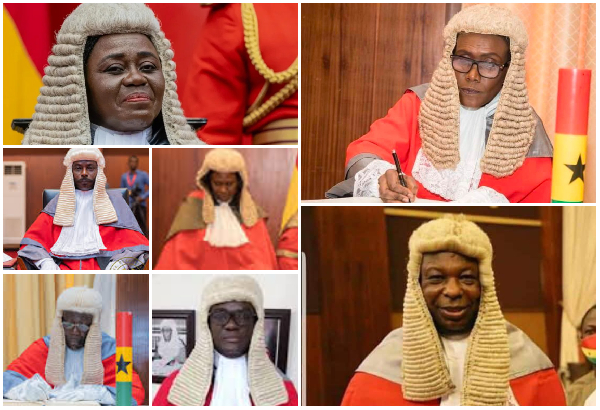US-based Ghanaian lawyer, Professor Stephen Kwaku Asare, responded to the Supreme Court of Ghana’s judgement on November 12, 2024, which overturned the Speaker of Parliament’s declaration of four seats as vacant.
Professor Asare, also known as Kwaku Azar, shared a statement on Facebook indicating that there may be additional aspects to the Court’s decision. He suggested that the reports of the Court’s justices upholding a challenge by a 5-2 majority may not provide a complete understanding of the judgement.
“The Court’s judgement has not been released.” I read that the decision is 5-2. I would not be shocked if this ends up being only partially accurate. This occurs when a judge determines there is no jurisdiction and does not participate in the substantive matter decision.
“If this perspective prevails, we may see a decision with a vote of 5-2 or 5-0. That is, 5-2 on jurisdiction and 5-0 on the substantive matter,” he wrote.
The academic explained the logic behind the ruling of the justices of the highest court of the land, which overturned Speaker Bagbin’s declaration.
He clarified that the ruling means that the provisions of Article 97 of the 1992 Constitution, which was central to the Speaker’s declaration, do not apply when Members of Parliament (MPs) switch their political affiliations to run in an election for a future Parliament.
The legal expert added that Article 97 would have been applicable if the MPs whose seats were declared vacant changed their affiliations to become MPs in the same Parliament under different party tickets.
“Second, I’ve seen some analysts question how an MP’s seat could be vacated in a future Parliament. Based on this, the decision of the Court has been called into question. Let’s proceed with caution. No one has indicated that a seat will be empty in the upcoming parliament. The upcoming parliament situation is a distraction.
He then explained the Court’s logic:
“What the Court could argue, from a comprehensive analysis of Article 97(1)(g) and (h) is:
An MP must leave their seat If he changes allegiance
And aims to retain their seat in Parliament under this new status. In simpler terms, Members of Parliament cannot alter the outcome of the general election by changing their allegiance.
Examples:
1. Parliament is evenly split. X, a Blue party member, switches to the Green Party and aims to maintain a seat in Parliament, resulting in a new composition of 49-51 in Parliament. No! X is prohibited from performing that action and is required to relinquish his seat. If he is a biased Member of Parliament, he is subject to Article 97(1)(g). If he is self-employed, he is covered by Article 97(1)(h).
2.The parliament is evenly split. X, a member of the Blue party, submits his nomination under the Green Party ticket in order to run for a seat in the upcoming Parliament representing the Green party. The Parliament is evenly split with a 50-50 balance. Indeed, X is permitted to engage in that action without the need to relinquish his seat. Article 97 is indifferent to future plans in parliament!
A reliable test is whether the MP’s actions have influenced the election outcome (such as changing a 50-50 result). If not, Article 97(1)(g) & (h) will not be activated.
The key point is that everyone, even an incumbent MP, has the freedom to run on any platform in a future election.
MPs are not obligated to run on the same ticket in the future nor are they required to give up their seats just because they want to join a new parliament with a different party.
To suggest otherwise would mean that once voters choose an MP, they limit the options available to the MP-elect in the next Parliament, which would go against the principles of democracy.
Regarding the Supreme Court’s decision:
On Tuesday, the Supreme Court of Ghana overturned Speaker Alban Bagbin’s declaration of four vacant seats in the House.
The Court’s ruling came after an application by the Member of Parliament (MP) for Effutu, Alexander Kwamina Afenyo-Markin, who contested the Speaker’s decision.
The MP, who continues to serve as Majority Leader, and his lawyers requested a clear interpretation of the Constitution’s provisions that the Speaker relied on for his declaration. Article 97 specifies that a Member of Parliament will lose their seat in Parliament if they switch parties or attempt to stay in Parliament as an independent member after leaving the party they were originally a part of when elected. (h) should he be elected a Member of Parliament as an independent candidate and decides to join a political party.
Afenyo-Markin asked the Court to declare the Speaker’s interpretation of Article 97 (g) and (h) as incorrect and to reverse the Speaker’s declaration of the seats of Andrew Amoako Asiamah (Fomena), Cynthia Mamle Morrison (Agona West), Kwadwo Asante (Suhum), and Peter Yaw Kwakye-Ackah (Amenfi Central) as vacant.
The Chief Justice, in announcing the Court’s decision, stated that a 5-2 majority upheld the Majority Leader’s application.
She highlighted that two justices disagreed with the application due to jurisdictional concerns.
Chief Justice Gertrude Torkornoo, Justice Mariam Owusu, Justice Samuel Kwame Adibu-Asiedu, Justice Ernest Yao Gaewu, and Justice Yaw Darko Asare supported the application.
Justice Avril Lovelace Johnson and Justice Issifu Omoro Tanko Amadu dissented from the majority opinion.


